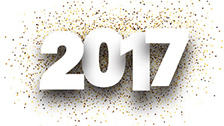
The Fiddlehead staff and editors obviously love books and read a lot of them. But which book did they read in 2017 would each recommend to the readers of The Fiddlehead? Most of these books were published this year, but not all (we believe excellent books are timeless)! Enjoy our picks, and please let us know which book you would recommend in the comments below.
____
Sabine Campbell, Reviews Editor, recommends Tracey Lindberg's Birdie (HarperCollins)
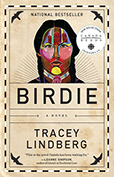 A book I’ve really enjoyed and found interesting is Birdie by Tracey Lindberg. It came out a couple of years ago — but I confess a 2017 book hasn’t sprung to mind. Birdie is a first nations woman, part Cree, and has suffered many of the problems that indigenous people fall prey to. The novel is in part spiritual, giving some magic to trees, it certainly isn’t linear, and sometimes difficult to follow. Perhaps the literature of indigenous Canadians will continue to develop into an important of Can Lit.
A book I’ve really enjoyed and found interesting is Birdie by Tracey Lindberg. It came out a couple of years ago — but I confess a 2017 book hasn’t sprung to mind. Birdie is a first nations woman, part Cree, and has suffered many of the problems that indigenous people fall prey to. The novel is in part spiritual, giving some magic to trees, it certainly isn’t linear, and sometimes difficult to follow. Perhaps the literature of indigenous Canadians will continue to develop into an important of Can Lit.
From the publisher: A big, beautiful Cree woman with a dark secret in her past, Bernice (”Birdie”) has left her home in northern Alberta to travel to Gibsons, B.C. She is on something of a vision quest, looking for family, for home, for understanding. She is also driven by the leftover teenaged desire to meet Pat Johns — Jesse from The Beachcombers — because he is, as she says, a working, healthy Indian man. Birdie heads for Molly’s Reach to find answers, but they are not the ones she expected. With the arrival in Gibsons of her Auntie Val and her cousin Skinny Freda, Birdie begins to draw from her dreams the lessons she was never fully taught in life. Informed by the lore and knowledge of Cree traditions, Birdie is a darkly comic and moving first novel about the universal experience of recovering from tragedy. At heart, it is the story of an extraordinary woman who travels to the deepest part of herself to find the strength to face the past and to build a new life.
Phillip Crymble, Poetry Editor, recommends Gary Barwin's No TV for Woodpeckers (Wolsak & Wynn/Buckrider Books)
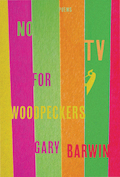 Last winter, Dana Hansen, the Editor-in-Chief at the Hamilton Review of Books, invited me to write an article on Gary Barwin's No TV for Woodpeckers for their spring issue. I'd recently solicited poems from Paul Vermeersch for The Fiddlehead and knew that he was heading up the Buckrider Books imprint at Wolsak & Wynn, so I had high hopes for Barwin's book, based solely on Paul's involvement.
Last winter, Dana Hansen, the Editor-in-Chief at the Hamilton Review of Books, invited me to write an article on Gary Barwin's No TV for Woodpeckers for their spring issue. I'd recently solicited poems from Paul Vermeersch for The Fiddlehead and knew that he was heading up the Buckrider Books imprint at Wolsak & Wynn, so I had high hopes for Barwin's book, based solely on Paul's involvement.
Much of No TV for Woodpeckers, as I mention in my review, is written out of a tradition predicated on constraint-based methodologies. What I found most appealing about these challenging, and, at times, willfully difficult poems, however, was their sense of play. So often, rigorously experimental work falls into the trap of taking itself too seriously, and this is something that Barwin consistently manages to avoid by allowing a certain amount of whimsy to inform his practice.
The poems in No TV for Woodpeckers that appealed most to my own sensibilities were those that welcomed in affect and subjectivity, and Barwin, it turns out, is as adept at lyricism as he is at the more conceptual poetries he tends to favour. It's not every poet who can display a decided mastery of the Oulipian N+7 noun substitution method in one poem, and break your heart in the next, but Barwin has the skill and versatility to do just that. A real pleasure getting to know the work of this important Canadian writer.
From the publisher: In No TV for Woodpeckers the lines between haunting and hilarious, wondrous and weird, beautiful and beastly, are blurred in the most satisfying ways. Many of these poems reveal a submerged reality full of forgotten, unknown or invisible life forms that surround us – that are us. Within this reality, Barwin explores the connection between bodies, language, culture and the environment. As philosophical as it is entertaining, No TV for Woodpeckers is a complex and multi-layered work that offers an unexpected range of pleasures.
Clarissa Hurley, Fiction Editor, recommends Lauren McKeon’s F-Bomb: Dispatches from the War on Feminism (Goose Lane Editions)
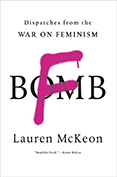 I readily declare myself a hostile witness when confronted with yet another new treatise heralding the alleged decline or troubled state of feminism. Books of the “what ails feminism today?” sub-genre, a creation of lazy journalism and soundbite publicity-speak, too often rest on faulty premises and prefer polemic to analysis. I can’t resist reading them, mind you, and I’m happily surprised that Lauren McKeon has raised the bar with F-Bomb, her intelligently eclectic examination of the complex factors that influence many contemporary young women’s apparent rejection of feminism. A journalist and former editor of This magazine, McKeon writes with deft precision, her nuanced analysis the result of extensive engagement with feminist-phobes and their ilk. This listen-rather-than-lecture approach is wise and necessary at a time when progressive and conservative forces, apparently more polarised than ever, seem at the same time increasingly difficult to distinguish from one another.
I readily declare myself a hostile witness when confronted with yet another new treatise heralding the alleged decline or troubled state of feminism. Books of the “what ails feminism today?” sub-genre, a creation of lazy journalism and soundbite publicity-speak, too often rest on faulty premises and prefer polemic to analysis. I can’t resist reading them, mind you, and I’m happily surprised that Lauren McKeon has raised the bar with F-Bomb, her intelligently eclectic examination of the complex factors that influence many contemporary young women’s apparent rejection of feminism. A journalist and former editor of This magazine, McKeon writes with deft precision, her nuanced analysis the result of extensive engagement with feminist-phobes and their ilk. This listen-rather-than-lecture approach is wise and necessary at a time when progressive and conservative forces, apparently more polarised than ever, seem at the same time increasingly difficult to distinguish from one another.
From the publisher: F-Bomb takes readers on a witty, insightful, and deeply fascinating journey into today's anti-feminist universe. Through a series of dispatches from the frontlines of the new gender wars, Lauren McKeon explores generational attitudes, debates over inclusiveness, and differing views on the intersection of race, class, and gender. She asks the uncomfortable question: if women aren't connecting with feminism, what's wrong with it? And she confronts the uncomfortable truth: for gender equality to prevail, we first need to understand where feminism has gone wrong and where it can go from here.
Mark Jarman, Fiction Editor, recommends two books.
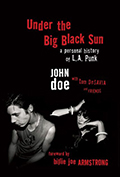 I am reading two very different histories, separated by 200 years. The first is Under the Big Black Sun: A Personal History of LA Punk by bass player John Doe and many others who contribute essays. I followed this scene from afar when I was a lad, especially bands like X, Gun Club, The Minutemen, Black Flag, Wall of Voodoo, The Blasters, and Los Lobos, and the book features gossipy druggy boozy accounts of the bands starting out and great black and white photos of the bands and their poetry zines and crude posters for the gigs at the Hong Kong Café, the Masque, and the Whiskey a Go Go.
I am reading two very different histories, separated by 200 years. The first is Under the Big Black Sun: A Personal History of LA Punk by bass player John Doe and many others who contribute essays. I followed this scene from afar when I was a lad, especially bands like X, Gun Club, The Minutemen, Black Flag, Wall of Voodoo, The Blasters, and Los Lobos, and the book features gossipy druggy boozy accounts of the bands starting out and great black and white photos of the bands and their poetry zines and crude posters for the gigs at the Hong Kong Café, the Masque, and the Whiskey a Go Go.
From the publisher (Da Capo Press): Under the Big Black Sun explores the nascent Los Angeles punk rock movement and its evolution to hardcore punk as it’s never been told before. John Doe of the legendary band X and co-author Tom DeSavia have woven together an enthralling story of the legendary West Coast scene from 1977-1982 by enlisting the voices of people who were there. The book shares chapter-length tales from the authors along with personal essays from famous (and infamous) players in the scene. Through interstitial commentary, John Doe “narrates” this journey through the land of film noir sunshine, Hollywood back alleys, and suburban sprawl. Illustrated with 50 rare photos, this is the story of the art that was born under the big black sun.
The second book of history came to me in Saint John; in Loyalist Coin I found a used book, Travels in North America, by John Mann, an 18 year old Scottish labourer who traveled on foot and in canoe around Maine, New Brunswick and into Quebec in the early 1800s. The book has fascinating accounts of knife fights on the ship, quarantine islands, winter starvation, summer drownings, and travels with native people in the St. John River valley. One dry fall he is caught in a forest fire upriver from Fredericton: “An unfortunate man, being the worse for liquor, was found next morning as black as a burnt root, all his clothes being burnt on his body and his shoes on his feet. His arms, legs and every part of his body were completely scorched and burnt. As he was so disfigured that he could not be put into a proper coffin, we nailed a few boards together, in that form in which he was lying. We wrapped him in a sheet, and buried in his own orchard, as is customary in that quarter.” I recently drove some of the same routes up to Quebec and Montreal and can attest that we have it much easier now and in the New Year I will try to appreciate that more and maybe start a punk band.
Ross Leckie, Editor, recommends Michael Kaan’s The Water Beetles (Goose Lane Editions)
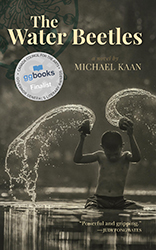 Michael Kaan’s The Water Beetles was shortlisted for this year’s Governor-General’s Award for Fiction, and it is a deserving nominee. The prose style is pristine, and his evocative use of metaphor creates a subtle range of tone and mood often missing in contemporary fiction. It is narrated in the first person by a Chinese child trying to survive the occupation of Hong Kong by the Japanese. I found it remarkable how compelling the limits of the first person could be when narrating a sweeping historical canvas. This novel recalls Ha Jin’s Nanjing Requiem. Ha Jin’s novel presents the sensational horror of war, however, whereas Kaan focuses on the war’s absurdity, the sheer blind luck of who survives and who doesn’t, the deprivations endured to get through. Kaan’s novel is about the Japanese occupation of China, so it has its share of horrific scenes, but it also is about days and weeks of boredom, of daily moments of pettiness or generosity, of periods of serenity and beauty. This is a first book, and so I can’t wait to see where Michael Kaan goes next.
Michael Kaan’s The Water Beetles was shortlisted for this year’s Governor-General’s Award for Fiction, and it is a deserving nominee. The prose style is pristine, and his evocative use of metaphor creates a subtle range of tone and mood often missing in contemporary fiction. It is narrated in the first person by a Chinese child trying to survive the occupation of Hong Kong by the Japanese. I found it remarkable how compelling the limits of the first person could be when narrating a sweeping historical canvas. This novel recalls Ha Jin’s Nanjing Requiem. Ha Jin’s novel presents the sensational horror of war, however, whereas Kaan focuses on the war’s absurdity, the sheer blind luck of who survives and who doesn’t, the deprivations endured to get through. Kaan’s novel is about the Japanese occupation of China, so it has its share of horrific scenes, but it also is about days and weeks of boredom, of daily moments of pettiness or generosity, of periods of serenity and beauty. This is a first book, and so I can’t wait to see where Michael Kaan goes next.
From the publisher: Written in restrained, yet beautiful and affecting prose, The Water Beetles is an engrossing story of adventure and survival. Based loosely on the diaries and stories of the author's father, this mesmerizing story captures the horror of war, through the eyes of a child, with unsettling and unerring grace.
Ian LeTourneau, Poetry Editor & Design and Layout, recommends Fail Better: Why Baseball Matters by Mark Kingwell (Biblioasis)
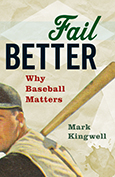 In this series of essays that range from short observational pieces that have the brevity of an at-bat to long rambling discussions that stretch out like an extra-innings game, Mark Kingwell joyfully mixes personal reflection, historical anecdotes, quirks, and philosophical analysis. The last aspect is what distinguishes this book from so many others about baseball. Where else will you see references to Aristotle while discussing the balk? And one of my favourite essays here is Kingwell’s discussion of the paradox “try easier” that managers suggest to players going through a hitting slump. To paraphrase Yogi Berra, this book is 90% philosophy, but the other half is pure fun.
In this series of essays that range from short observational pieces that have the brevity of an at-bat to long rambling discussions that stretch out like an extra-innings game, Mark Kingwell joyfully mixes personal reflection, historical anecdotes, quirks, and philosophical analysis. The last aspect is what distinguishes this book from so many others about baseball. Where else will you see references to Aristotle while discussing the balk? And one of my favourite essays here is Kingwell’s discussion of the paradox “try easier” that managers suggest to players going through a hitting slump. To paraphrase Yogi Berra, this book is 90% philosophy, but the other half is pure fun.
From the publisher: “Taking seriously the idea that baseball is a study in failure — a very successful batter manages a base hit in just three of every ten attempts — Mark Kingwell argues that there is no better tutor of human failure’s enduring significance than this strange, crooked game of base, where geometry becomes poetry. Weaving elements of memoir, philosophical reflection, sports writing, and humour, Fail Better is an intellectual love letter to baseball by one of North America’s most engaging philosophers. Kingwell illustrates complex concepts like theoretically infinite game-space, “time out of time,” and the rules of civility with accessible examples drawn from the game, its history, and his own halting efforts to hit ‘em where they ain’t. Beyond a “Beckett meets baseball” study in failure, Kingwell crafts a thoughtful appreciation of why sports matter, and how they change our vision of the world.”
Sue Sinclair, Associate Editor, recommends Jordan Abel’s Injun (Talonbooks)
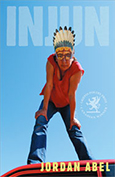 Am I really going to write about the Griffin Prize winner? I thought to myself. Isn’t the word already out, isn’t this kind of redundant? Yes, in a way it is, but I still want to say something about Jordan Abel’s Injun, an appropriation, rearrangement, arraignment of the language of cowboy-and-Indian Westerns. Because if there’s one thing this collection makes clear, it’s that repetition isn’t necessarily redundant. Jordan highlights repetitions, sometimes through judicious alignment, sometimes through absence. In the “Appendix,” Jordan erases the word “injun” from a conglomerate of lines taken from Westerns, making me, a Settler reader, uneasily complicit as I fill in the gaps, inserting “injun” back into the text, again and again. It’s a humbling experience, not just feeling myself repeating the word, but also becoming aware of the absence I overwrite with each repetition, performing a kind of cover up — for the absence in the text echoes the relative absence of “injuns” and their experiences from my mind, a fact I’d rather forget but am trying to face. This book is not for me — it’s dedicated to “the Indigenous peoples of the Americas” — but it has been a meaningful facet of my 2017. And it bears repeating.
Am I really going to write about the Griffin Prize winner? I thought to myself. Isn’t the word already out, isn’t this kind of redundant? Yes, in a way it is, but I still want to say something about Jordan Abel’s Injun, an appropriation, rearrangement, arraignment of the language of cowboy-and-Indian Westerns. Because if there’s one thing this collection makes clear, it’s that repetition isn’t necessarily redundant. Jordan highlights repetitions, sometimes through judicious alignment, sometimes through absence. In the “Appendix,” Jordan erases the word “injun” from a conglomerate of lines taken from Westerns, making me, a Settler reader, uneasily complicit as I fill in the gaps, inserting “injun” back into the text, again and again. It’s a humbling experience, not just feeling myself repeating the word, but also becoming aware of the absence I overwrite with each repetition, performing a kind of cover up — for the absence in the text echoes the relative absence of “injuns” and their experiences from my mind, a fact I’d rather forget but am trying to face. This book is not for me — it’s dedicated to “the Indigenous peoples of the Americas” — but it has been a meaningful facet of my 2017. And it bears repeating.
From the publisher: Award-winning Nisga’a poet Jordan Abel’s third collection, Injun, is a long poem about racism and the representation of Indigenous peoples. Composed of text found in western novels published between 1840 and 1950 — the heyday of pulp publishing and a period of unfettered colonialism in North America — Injun then uses erasure, pastiche, and a focused poetics to create a visually striking response to the western genre.
Emily Skov-Neilsen, Marketing and Promotions, recommends Catriona Wright, Table Manners (Véhicule Press)
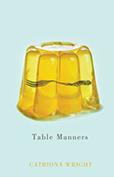 Catriona Wright’s debut poetry book, Table Manners, is truly a feast — a lively BBQ, elegant dinner party, and dumpster dive all in one. Poetry lovers of all sorts are sure to walk away wholly energized and gratified by this book’s rich, gutsy imagery and sassy intelligence: “That it is ketchup-tinged burps, Cool Hand Luke swilling pickled eggs,/ strawberry milkshake sliding down a throat, the primal thrill/ of fill fill fill, a monsoon of Coke.” (“Confessions of a Competitive Eater”). Be prepared to eat your way out.
Catriona Wright’s debut poetry book, Table Manners, is truly a feast — a lively BBQ, elegant dinner party, and dumpster dive all in one. Poetry lovers of all sorts are sure to walk away wholly energized and gratified by this book’s rich, gutsy imagery and sassy intelligence: “That it is ketchup-tinged burps, Cool Hand Luke swilling pickled eggs,/ strawberry milkshake sliding down a throat, the primal thrill/ of fill fill fill, a monsoon of Coke.” (“Confessions of a Competitive Eater”). Be prepared to eat your way out.
From the publisher: Carnal, flamboyant, visceral and bold, Table Manners is a rich meal. Catriona Wright’s debut introduces us to the image of the poet as “gastronaut,” a figure who seems to live entirely between table and a stove and who steeps her surroundings and relationships in complex emotional flavours. “My life,” she writes, “is now tuned to bone marrow donuts and chef gossip. I’m useless at any other frequency.” Wright’s wild narratives are sometimes funny, sometimes frightening and always ravishingly observed. Table Manners is what might have emerged had Julia Child written like Sharon Olds, or if Anthony Bourdain knew his way around a line-break.










Add new comment